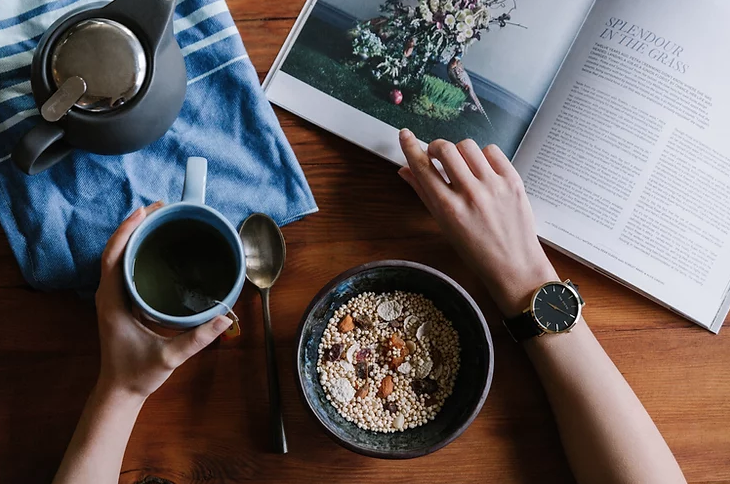
“Morning is an important time of day, because how you spend your morning can often tell you what kind of day you are going to have.” – Daniel Handler
Many of us are busy, have a lot of responsibilities and obligations, and often feel strapped for time. Mornings set the tone for your day. Having a great morning routine can make all the difference in being productive, achieving goals, feeling organised, and doing all of this with confidence.
Here are 10 Ideas to Help You Design A Morning Routine
1. Never hit the snooze button
According to Spall and Xander (2018), highly productive people don’t hit the snooze button. Studies show that every time you wake up, hit snooze and then roll back over, you enter a brand-new new sleep cycle. The extra sleep you do get from hitting the snooze button is light and fragmented, which can leave you feeling more tired (Van Edwards, 2020).
2. Make your bed
According to McRaven (2018), if you make your bed every morning, you will have accomplished the first task of the day. It will give you a small sense of pride, and it will encourage you to do another task, and another, and another.
3. Set your Most Important Tasks for the day
A major goal of any productive morning routine is to set your intention and tone for the day. Do you want to feel focused or scattered? Are you starting the day with a purpose or just reacting to other people? Try to set aside the first hour or more of your day without email or chat. This way, you can make progress on meaningful work and build a habit of committing to your priorities (MacKay, 2019).
4. Say no to unreasonable requests
Declining and saying no to extra tasks that are not urgent can be the key to staying productive. Adding extra tasks and jobs to your day can immediately throw your routine off balance, and it can negatively impact your day’s productivity (Drmsriram, n.d.).
5. Morning meditation
Practicing meditation can help us feel grounded, focused, and ready to effectively prioritise tasks. Skipping this step can lead us to continue feeling rushed and less effective in our day. Practicing meditation also allows us to reset and be fully present in the moment. Practicing meditation, can help set the tone of the day to help you feel calm, relaxed, and in control (Clarke, 2020).
6. Exercise
Exercise can raise energy levels, combats stress, battles fatigue and improves general well-being. Studies show that the more energetic you feel, the more motivated and productive you will be throughout the day (Clarke, 2020).
7. Eat a healthy breakfast
If you skip breakfast, you might find yourself feeling a bit sluggish and struggle to focus on things. Studies suggest that not having breakfast affects your mental performance, including your attention, ability to concentrate and memory. This can make some tasks feel harder than they normally would (Better Health Channel, n.d.).
8. Drink a full glass of water.
Drinking water first thing in the morning immediately helps rehydrate the body. Mild dehydration has negative effects on mood and energy levels. Studies show that dehydration has been associated with increased fatigue, anger, and confusion as well as mood problems and decreased vigor (Popkin, D’Anci, & Rosenberg, 2010).
9. Use Daily Affirmations or Keep a daily gratitude journal
Gratitude can help us feel more positive emotions, relish good experiences, improve our health, deal with adversity, and build strong relationships (Harvard Medical School, n.d.).
10. Read a blog post or article.
Research has shown that reading makes us feel better and more positive. When we read, we can start our day feeling inspired and motivated, we can gain valuable insights and ideas that we can implement right away and accelerate our personal growth (Clarke, 2020).
Finally, it is important to constantly make adjustments to ensure your daily routine continues to work for you as your life changes. Reviewing your day with intent allows you to maintain control over your schedule rather than your schedule controlling you. Be honest with yourself as to the importance of certain tasks and remember that not everything can be a top priority.
Sources
Better Health Channel. (n.d., March 12). Breakfast. Retrieved from https://www.betterhealth.vic.gov.au/health/healthyliving/breakfast
Clarke, J. (2020, September 17). Want to Be More Productive and Confident? Develop a Morning Routine. Retrieved from https://www.verywellmind.com/morning-routine-4174576
Drmsriram. (n.d., January 01). PRODUCTIVITY SPECIAL… Leon’s Daily Routine for Maximum Productivity. Retrieved from http://drmsriram.blogspot.com/2018/03/productivity-special-leons-daily.html
Harvard Medical School. (n.d.). Giving thanks can make you happier. Retrieved from https://www.health.harvard.edu/healthbeat/giving-thanks-can-make-you-happier
MacKay, J. (2019). The 21 Daily Routines and Habits of Highly Productive Founders and Creatives. Retrieved from https://plan.io/blog/daily-routines/
McRaven, W. H. (2017). Make your bed: Little things that can change your life –and maybe the world. New York: Grand Central Publishing.
Popkin, B., D’Anci, K., & Rosenberg, I. (2010, August). Water, hydration, and health. Retrieved from https://www.ncbi.nlm.nih.gov/pmc/articles/PMC2908954/
Spall, B., & Xander, M. (2018). My morning routine how successful people start every day inspired. New York: Portfolio/Penguin.
Van Edwards, V. (2020, April 22). Perfect Your Morning Routine With 10 Research Backed Steps. Retrieved from https://www.scienceofpeople.com/morning-routine/